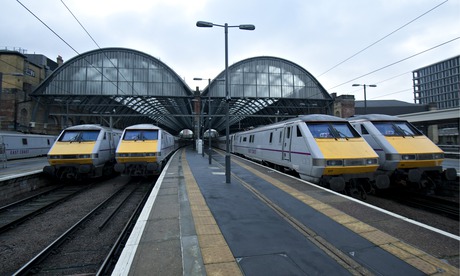Britain’s rail industry blame game: all fingers point at the government
Regulated fares such as season tickets have risen by over 20% during this parliament, while wages have gone up less than 7%

The blame game on Britain’s railways is a curious one. Train operators, trade unions and Network Rail all take credit for improvements in passenger numbers and safety. But when it comes to the fare rises that pay for them, the sector immediately points the finger at the government.
Next week commuters return to work with the cost of their season tickets rising by up to 2.5%, under a fares system that is ultimately controlled by the Treasury.
The chancellor, in what has become a pre-autumn statement tradition, had attempted to soften the blow by generously “freezing” fares at the RPI rate of inflation, but that is still running ahead of wage growth of 1.6%.
Regulated fares such as season tickets have risen by over 20% during this parliament, in a period when average wages will have gone up less than 7%. Yet with the mainstream parties agreeing to transfer more railway funding from the taxpayer to the farepayer, reducing the annual state subsidy of around £4bn, something has to give.
All of this is taking place against a backdrop of renewed criticism of Network Rail, the operator of Britain’s tracks and stations, after delays to finishing Christmas engineering work caused chaos at two of London’s busiest stations – King’s Cross and Paddington. Network Rail’s chief executive, Mark Carne, has waived his bonus and executives face a grilling by MPs.
It is a dire PR blow at a time of year when many commuters are asking why they have to pay more than £1,000 for a season ticket and the government is feeling the financial cost of the railways more keenly.
Network Rail’s spiralling £38bn debt is now on the state balance sheet after it was reclassified as a government body, and a £500m increase in the original budget for mainline electrification projects has already given the transport secretary, Patrick McLoughlin, an unexpected shock.
Now the Office of Rail Regulation (ORR), Network Rail’s watchdog, is mounting a series of challenges to a management regime that has just embarked on a new five-year funding period with a £36bn budget.
Shortly before the Christmas engineering failures, the regulator wrote to Network Rail expressing “real concern” after a “very disappointing” first six months under new boss Carne, when “critical milestones have been missed” and there were “major discrepancies” between plans and delivery.
ORR chief executive Richard Price warned: “It is essential for your company’s credibility as an infrastructure manager that this is put right.”
Punctuality has fallen to its worst level in five years, with the ORR finding that in the first seven months of Network Rail’s five-year funding period 50,000 more trains than expected had run late. Nationally, 89.1% of trains ran on time, 0.7 percentage points off target and down 1.5 percentage points from a year ago.
Carne responded by admitting: “The reality is there has been a gradual but steady decline in train performance since the record highs of 2011. Since I started in this job in February my focus has been on reversing this decline.”
Congestion is the key to Network Rail’s problems, Carne argues, brought on by the very success the industry flaunts. Passenger numbers have risen steadily for years, and are on course to break a new record of more than 1.6bn journeys in 2014-15.
Carne says that the infrastructure they are building – and in many cases rebuilding – is crucial to relieving that congestion. But he said: “We are performing the equivalent of open heart surgery on a live network, which makes the task of running a reliable railway that much harder.”
Price accepts that congestion has amplified any failures. “A single asset breakdown can mean more delays than five years ago, so the condition of the assets is even more important.
“We want Network Rail to move to a predict and prevent approach so they understand risks and address them long before they become a risk to passengers.”
But, he says, they are bungling the basics. “When we look at the data, we’ve observed a lot of inconsistencies month to month in reporting on how much work they have done.” The management, he says, has failed even to get the facts about its tracks straight.
“Some of it is reported in miles or chains, some in kilometres. There have been issues around the management of information for years, and we’ve been looking to hold NR to account for asset management for a long time.”
In an interview with the Guardian before the Christmas fiasco, Price was more conciliatory towards Network Rail than his letter might suggest. “When there’s a problem I see Network Rail’s track staff go in to sort it out heroically. The thing we want to see more is work done well in advance so crisis situations don’t emerge.”
He believes Network Rail failed to maintain its tracks, structures and signals adequately, and now the results are emerging.
“Drainage sounds dull, but it’s really important for track geometry, preventing problems with circuits in signalling – particularly this time of year – that can cause big delays if you have too much water running in the wrong places. Mix that with electricity and it can cause real problems.”
Some are uneasy about the new regime. The RMT union fears the longer endgame may be to push the publicly owned Network Rail back into private hands via a sale or flotation. The union questions how the ORR can be criticising failing performance on one hand and demanding cuts on the other.
Tony Berkeley, a Labour peer and transport expert, says there has been a series of worrying incidents, including one where a signal post near Newbury in Berkshire fell on to a track and brushed a passing train.
“The post had rusted through. Are there any footbridges in a similar state?” He points to a 10% drop in maintenance train runs. “If there’s all this money, why did they run fewer? I suspect it was because of the budget cuts.”
Price rejects claims that safety could be threatened by the focus on saving money. “It’s absolutely reasonable that we look at what it ought to cost, and that it works safely and efficiently for customers and taxpayers.”
He says Network Rail is halving the day-to-day running costs of the railway. “We’ve set a target of 19% savings for the current five-year period. We think that brings them into line with the most efficient in Europe.”
Unions fear that those savings come at a cost to jobs and conditions. Train operators, who take the flak for most delays, bemoan their single-digit profit margins and blame Network Rail for delays.
Meanwhile, Price won’t offer a view on whether fares are fair. “The decisions around fares are for the government. But they reflect the underlying costs.”

沒有留言:
張貼留言